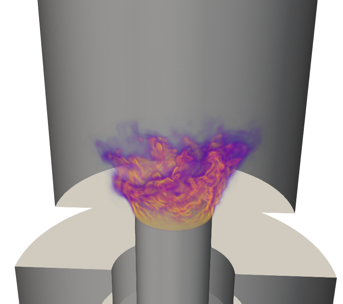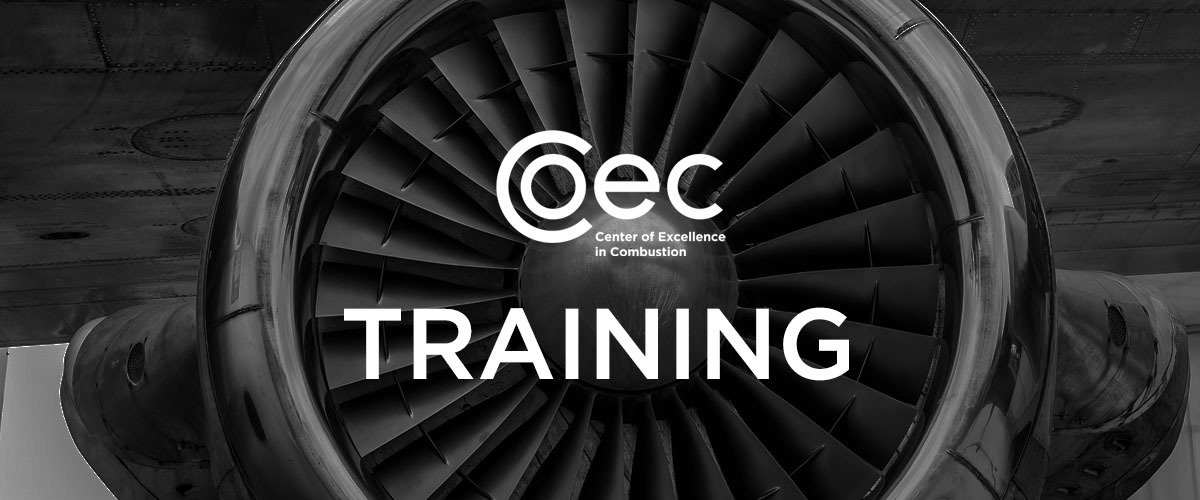Understanding and PredictingHydrogen Combustion
Wednesday, 30th November 2022 – Friday, 2nd December 2022
Barcelona Supercomputing Centre, BSC Auditorium (S1-2-1)
Plaça Eusebi Güell, 1-3, 08034 Barcelona, Spain
Current EU decarbonization strategies are promoting the use of green hydrogen across different sectors from energy power generation to transportation in automotive, marine and aerospace applications. In these applications, the hydrogen is converted directly into electricity by the use fuel cells, or converged into heat by combustion.
In the Center of Excellence in Combustion (CoEC), new methodologies for the efficient simulation of hydrogen flames are being developed using High-Performance Computing (HPC). As part of this initiative, CoEC researchers will share new findings and methodologies for the understanding and prediction of hydrogen combustion.
Within this frame, this training course is bringing together a number of experts to discuss the potential application of hydrogen across different sectors and provide the attendees with some practical aspects for the modelling and simulation of hydrogen combustion.
The course is divided into three main parts:
- Introduction to the hydrogen economy, production and storage.
- Theory and fundamentals of H2 combustion.
- Numerical methods and tools for post-processing and analysis.
CoEC researchers and external speakers representing different sectors are coming together to discuss the challenges
and opportunities for the utilization of hydrogen in practical applications.
The course includes lectures, open sessions and hands on activities.
PROGRAMME:
30/11/2022 – Day 1: Role of hydrogen in the energy and transportation green transition
This session introduces the context and market opportunities of hydrogen across different sectors from production to utilization. External speakers from industry and academia will give lectures on the application of hydrogen for power generation and transportation.
Part I: The Hydrogen Economy: A Background
9:00 - 9:15
9:15 - 10:15
10:15 - 11:15
Welcome and Introduction
The role of hydrogen in a sustainable energy system - Albert Tarancon (IREC)
Overview of the hydrogen value chain: from production to utilization
Olivier Joubert (CNRS-Universite Nantes)
11:15 - 11:45
Coffee break
Part II: Utilization of hydrogen by industrial sector
11:45 - 12:30
12:30 - 13:15
13:15 - 14:45
14:45 - 15:30
Use of hydrogen in road transportation - Ricardo Novella (CMT-UPV)
Aviation: Hydrogen Powered Aircraft: Challenges and Research - Stephan Zurbach (SAFRAN)
Lunch
Marine: Decarbonisation of the marine sector: Specific challenges and solution approaches
German Weiser (WinGD)
15:30 - 16:15
Energy production: Clean Hydrogen Power Generation in Gas Turbines – Challenges and Pathway - Christoph Kortschik (Siemens Energy Global GmbH)
16:15 - 17:00
Heating sector: Potentials and challenges of hydrogen to decarbonize the heating sector - Stephan Kruse (Viessmann)
17:00 - 17:15
Conclusions and outlook
01/12/2022 – Day 2: From theory to simulation of hydrogen flames
This session introduces the fundamentals of hydrogen combustion from theory to simulations using high-fidelity methods. It includes lectures and hands on activities where the students can utilize the physical models and numerical methods described in the lectures.
9:30 - 11:00
Theory and fundamentals of H2 combustion I - Prof. Heinz Pitsch (RWTH Aachen University)
This lecture aims to highlight the effects of hydrogen thermo-physical properties on the combustion process. First, the hydrogen combustion chemistry will be discussed in the context of the high burning velocities. Then, the focus will be on hydrodynamic and thermo-diffusive instabilities including the physical mechanisms behind them, the impact on laminar premixed flames and on lean turbulent flames, and the possibility of modelling such non-linear phenomena.
11:00 - 11:30
11:30 - 13:00
Coffee break
Theory and fundamentals of H2 combustion II - Prof. Benedicte Cuenot (CERFACS)
In this lecture, all the necessary numerical and modelling aspects for the simulation of hydrogen flames will be reviewed. This will include chemical models, transport models, as well as turbulence and flame / turbulence interaction models in the context of Large Eddy Simulation (LES). The various flame combustion regimes will be described, and some particular flame behaviours will be highlighted, like flame-wall interaction, and flame stabilization. The lecture will end with the numerical study of some technical challenges raised using hydrogen as a fuel in practical systems.
13:00 - 14:30
14:30 - 16:00
Lunch break
Numerical methods for turbulent reactive flows - Prof. Ananias Tomboulides (Aristotle University of Thessaloniki) and Dr. Daniel Mira (Barcelona Supercomputing Center)
This part provides an overview and perspective on the computational requirements to simulate turbulent flames in the context of DNS and LES. It will introduce different levels of modelling like RANS, LES, and DNS, solution approaches low Mach or fully compressible, discretization strategies, and high-order methods, with an overview of different algorithms and strategies that can be used to accelerate the computations. The last part of the lecture will introduce some practical applications of LES for hydrogen combustion with a focus on the numerical and modelling aspects described in previous lectures.
16:00 - 17:30
Hands-on exercises I
This hands-on session is focused on the computation and characterization of hydrogen flames using the Cantera software. The effects of chemistry and transport will be discussed in the context of 1D flames with emphasis on the chemistry description and the flame structure.
02/12/2022 - Day 3: Understanding and predicting hydrogen flames
9:30 - 11:00
Hands-on exercises II
This hands-on session is focused on the study of numerical methods applied to the solution of reactive flow simulations. The students will have the opportunity to select different numerical methods and explore their influence on the accuracy and cost of the simulations in the context of hydrogen flames. Laminar flames and weakly turbulent flames will be used as examples.
11:00 - 11:30
11:30 - 13:00
Coffee break
Data-driven analysis of turbulent reactive flows – Prof. Alessandro Parente (Université libre de Bruxelles) and Dr. Temistocle Grenga (RWTH Aachen University)
The use of machine learning algorithms to predict the behaviors of complex systems is booming. The present talk reviews some open opportunities for applying data-driven, reduced-order modelling to tackle some of the challenges associated with combustion modelling: the large dimensionality of detailed chemical mechanisms and the complex turbulence-chemistry interactions. Examples of feature extraction in turbulent combustion data, empirical low dimensional manifold identification, classification, regression, and reduced-order modelling are provided.
13:00 - 14:30
14:30 - 17:30
Lunch break
Hands on exercises III
The last hands-on session is focused on the study of the methodologies used for the analysis of massive databases. These methodologies are a common feature to be able to automatically extract non-linear dependency among the quantities of interest. The students will have the possibility to learn more about the structure of data-driven algorithms, explore the effects of tuning parameters on the models extracted and their accuracy. Laminar flames and weakly turbulent flames will be used as examples.


Programme can alsobe downloadedhere
REGISTRATION IS NOW CLOSED
REGISTRATION FEES:
The registration fee includes lunch, coffee and tea over the 3-day meeting. It also includes an invitation for night visit to Gaudi´s La Pedrera building and a dinner on the second day of the course. Please note, course fees do not include accommodation.
- Please contact ERCOFTAC CADO: admin@cado-ercoftac.org if you have any questions.
Due to the structure of the training which includes apart from lectures also the open sessions and hands on activities
we can only offer possibility to attend in person.
ACCOMMODATION:
- Residencia Universitaria Torre Girona (next to the BSC)
Psg. Dels Til.lers, 19; 08034-Barcelona
Tel. +34 93 390 43 00
Email: torregirona@resa.es
Double for single use: aprox. 78-88 €
- Other university residences in Barcelona: www.resa.es
- List of hotels is available below:



